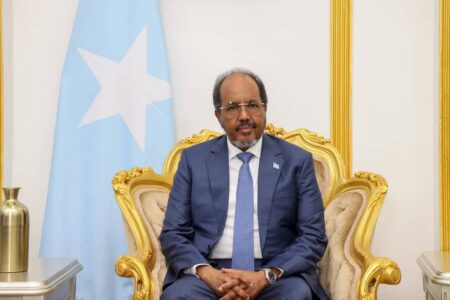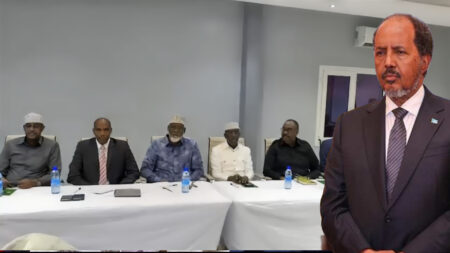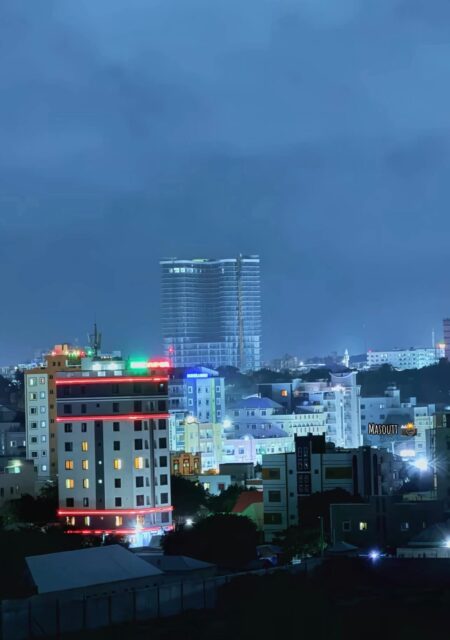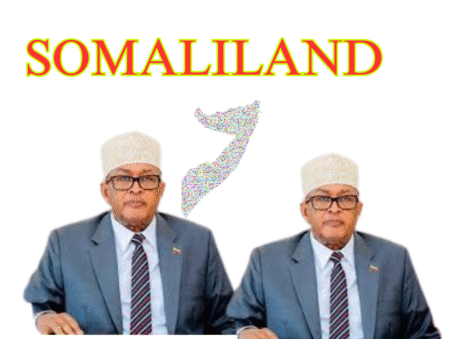ESTABLISHING BANADIR STATE WITH MOGADISHU AS DUAL CAPITAL UNDER THE BERLIN
Somalia’s federal system, comprising several autonomous states, effectively manages local matters while contributing to national governance. However, the capital, Mogadishu, is part of Banadir State, which currently lacks the full autonomy granted to other regions. This limitation hampers its capacity to manage local governance and resource distribution. Hence, this paper proposes the creation of Banadir State under the ‘Berlin System,’ with Mogadishu serving as both Banadir State’s capital and Somalia’s federal capital. The paper details how these dual functions would operate, the relationship between the state and federal governments, and the collaborative roles of Banadir State ministries with their federal counterparts, all aimed at enhancing local governance efficiency and effectiveness in Banadir State.
The Berlin model, a governance system where a city functions as both the national capital and the capital of a federal state, has been effectively adopted in Germany. Berlin, the nation’s capital, is one of the 16 federal states. This structure enables Berlin to handle its local affairs via a state government while hosting the country’s national institutions. The successful implementation of this model in Germany sets a compelling example for its proposed adoption in Somalia, boosting confidence in its potential success. Under the proposed system, Mogadishu would take on two clearly defined roles within Somalia. As the capital of Banadir State, it would possess full administrative authority over its internal affairs. At the same time, it would remain the seat of the federal government, where national institutions would function alongside the state-level administration. This distinct separation of responsibilities is essential to prevent conflicts and ensure that local and national interests are appropriately managed. This provides a practical and feasible solution to the current governance structure, offering significant benefits to both levels of governance, including improved local governance efficiency and effectiveness in Banadir State.
Historical and Political Importance
For centuries, Mogadishu has been the central lifeblood of Somalia, acting as the country’s political, economic, and cultural epicentre. As the largest city, it has played a crucial role in shaping national policies and driving economic growth. Its historical importance as a centre for trade, diplomacy, and political influence is unmatched. As the nation’s capital, Mogadishu is home to essential federal institutions such as the presidency, parliament, and numerous ministries. Mogadishu’s historical and political significance is central to the proposal of establishing Banadir State, with Mogadishu serving as a dual capital under the Berlin System. Despite its importance, the city has not experienced the same level of governance as other regions under Somalia’s federal system. At present, it is governed by the Banadir State Administration, which lacks the power to enact laws or manage resources as effectively as a state. Establishing Banadir State would resolve this by granting Mogadishu a formal state government capable of overseeing local services and advocating for the city’s interests at the federal level.
Establishing Banadir State can address various governance challenges specific to Mogadishu, including:
- Service Delivery: As a densely populated urban centre, Mogadishu faces unique challenges in delivering public services such as healthcare, education, and infrastructure. A state government would have greater authority and resources to manage these services efficiently, improving the quality of life for residents.
- Political Representation: Mogadishu’s residents are currently underrepresented in the federal system. Banadir would have elected representatives in Somalia’s upper parliament as a federal state, giving it a more effective voice in national decision-making.
- Resource Management: Mogadishu struggles to manage its economic resources effectively without state-level authority. Establishing Banadir State would allow the region to collect and allocate taxes, manage public resources, and implement long-term development projects independently.
Governance Structure of Banadir State
Executive Branch
A governor-president, similar to the structure of other Somali federal states, would lead the executive branch of Banadir State. The governor-president would serve as the head of the state government and oversee the implementation of state laws, policies, and services. The Governor’s office would manage local governance while coordinating with the federal government on shared concerns like security, infrastructure, and economic development.
Role of the Governor-President
The Governor-President would ensure that the state’s policies align with the interests of Mogadishu’s residents while also adhering to national laws and priorities. The Governor-President would have the authority to oversee state ministries, appoint officials, and manage state-level resources. Additionally, the Governor-President would represent Banadir State in discussions with the federal government, ensuring that the city’s unique needs are addressed in national policymaking.
Banadir State would establish a regional legislature composed of elected representatives from the region. This body would have the authority to pass laws related to local governance, including areas such as public services, taxation, and infrastructure development. The legislature would function independently of the federal parliament but would remain subject to the overarching national constitution.
The legislature would serve as the primary decision-making body for local issues. It would have the authority to pass laws that address the specific needs of Mogadishu, such as urban planning, local taxes, and social services. The legislature would also have the power to scrutinise the actions of the governor—president, and the state ministries, ensuring that they remain accountable to the people of Mogadishu. Additionally, the legislature would represent Mogadishu’s residents at the federal level by electing representatives to the national parliament’s upper house.
Judicial Branch
Banadir State would establish its judiciary, with courts responsible for handling civil, criminal, and administrative matters. These courts would operate independently of the federal judiciary but adhere to national legal frameworks. While the state judiciary would manage most local legal issues, specific cases, such as constitutional disputes or matters involving national law, would still fall under the jurisdiction of federal courts.
Interaction between State and Federal Courts
Banadir State’s judiciary would handle day-to-day legal matters, such as local disputes, enforcement of state laws, and civil cases. However, the federal judicial system, including the Supreme Court, would retain jurisdiction over constitutional issues and conflicts between state and federal laws. Cooperation between state and federal courts would be crucial to ensure a consistent legal framework across the country.
Interaction Between Banadir State and the Federal Government
- Shared Responsibilities: Security and Law Enforcement: Mogadishu’s security is paramount, given its role as the country’s national capital and largest city. Under the Berlin System, the responsibility for security would be shared between the federal and state governments. Banadir State would establish a local police force responsible for maintaining law and order within the region, focusing on crime prevention, community policing, and traffic management. At the same time, the federal government would retain control over national security agencies, including the military and intelligence services. The federal government’s role would involve addressing more significant security threats, such as terrorism and organised crime, that transcend local law enforcement capabilities. The federal government would also manage security for federal institutions based in Mogadishu, such as the Presidency, Parliament, and embassies.
- Security Cooperation Mechanisms: Banadir State and the federal government must establish clear communication channels and joint security operations to avoid jurisdictional conflicts. For example, intelligence-sharing agreements could be implemented to ensure that both levels of government are aware of potential threats. Additionally, joint task forces could be formed to address issues requiring local and national resources, such as counter-terrorism operations or emergency responses.
- Fiscal Management and Revenue Sharing: One key challenge in creating Banadir State is managing the region’s fiscal relationship with the federal government. As the economic hub of Somalia, Mogadishu generates significant revenue through taxes on businesses, property, and trade. Banadir State could collect local taxes, such as property and sales taxes, and use this revenue to fund public services and infrastructure projects. However, the federal government would continue to collect national taxes, such as income tax and customs duties. A revenue-sharing agreement would ensure that both Banadir State and the federal government have the necessary resources to fulfil their responsibilities. This agreement would define the percentage of national tax revenue allocated to Banadir State, considering the region’s economic contributions and the cost of providing public services to a large urban population.
- Challenges in Fiscal Management: The primary challenge in fiscal management is ensuring that Banadir State retains enough revenue to manage its local needs while contributing to the national budget. Given Mogadishu’s economic importance, there may be disputes over how much of the city’s revenue should be allocated to the federal government versus retained by the state. Careful negotiation would be required to strike a balance that satisfies both local and national interests.
- Infrastructure and Urban Development: Banadir State would take responsibility for local infrastructure projects, such as road maintenance, public transportation systems, and the construction of schools and hospitals. The state could plan and implement these projects independently, using its budget and resources. However, given their national importance, specific infrastructure projects like highways, airports, and ports would remain under federal jurisdiction.
- Coordination in Urban Development: Banadir State and the federal government must collaborate on urban planning to align local and national infrastructure projects. For example, suppose the federal government plans to build a new airport or expand a port in Mogadishu. In that case, it must coordinate with Banadir State to ensure the project fits within the city’s broader development plan. Joint planning committees could be established to facilitate this coordination and prevent overlapping efforts.
- Diplomatic Presence and Foreign Relations: As Somalia’s national capital, Mogadishu hosts numerous foreign embassies, international organisations, and NGOs. While foreign relations remain the exclusive responsibility of the federal government, Banadir State could engage in economic diplomacy by fostering partnerships with global organisations to support local development. For example, Banadir State could attract foreign investment for urban development projects or collaborate with international NGOs on healthcare and education initiatives.
- Role of Banadir State in Economic Diplomacy: While Banadir State’s role in foreign relations would be limited, it could still be important in promoting the region as an attractive destination for foreign investment. For example, the state government could work with international businesses to attract investment in infrastructure, technology, and tourism. However, all foreign relations activities must align with Somalia’s national foreign policy, and the federal government would retain ultimate control over diplomatic matters.
The Governor-President would serve as the executive head of Banadir State, much like the Governing Mayor of Berlin. The Governor would set policy priorities, appoint ministers, represent Banadir in negotiations with the federal government, and ensure that state operations run efficiently. Key Responsibilities:
- Lead the executive branch and ensure smooth coordination between ministries.
- Represent Banadir State in discussions with the Federal Government of Somalia.
- Appoint critical officials, including ministers, subject to approval by the regional parliament.
- Oversee the implementation of state policies and budgets.
- Ministry of Security
The Ministry of Security would maintain law and order within Banadir, a critical role given Mogadishu’s security challenges. This ministry would manage local police forces and coordinate with federal agencies on broader security matters. The key responsibilities will be:
- Ensure public safety through law enforcement and community policing initiatives.
- Manage and train local police forces to respond to crime, terrorism, and unrest.
- Collaborate with federal security agencies on national security operations, including counterterrorism.
- Oversee emergency response systems and disaster management.
- Ministry of Finance
The Ministry of Finance would manage Banadir’s financial resources, ensuring efficient tax collection, proper budgeting, and responsible expenditure. This ministry would ensure fiscal discipline and funding of critical state projects. The key responsibilities include:
- Collect and manage state revenues, including local taxes and fees from Mogadishu’s port and businesses.
- Develop the state’s budget and allocate funds to different ministries.
- Ensure transparency and accountability in public spending.
- Engage in financial planning to support economic growth and infrastructure development.
- Ministry of Urban Development and Infrastructure
This ministry would be in charge of planning and managing the urban development of Mogadishu and the surrounding areas. Given Mogadishu’s rapid growth, this ministry would focus on sustainable development, urban infrastructure, and housing. The key responsibilities include:
- Develop long-term urban planning strategies to manage Mogadishu’s expansion.
- Oversee the construction and maintenance of critical infrastructure like roads, bridges, and public utilities.
- Implement housing policies to address issues like overcrowding and slum development.
- Work with private developers and international partners on significant infrastructure projects.
- Ministry of Education
The Ministry of Education would manage the entire education system in Banadir, from primary schools to universities. This ministry would ensure that education is accessible, relevant, and meets local and national standards. The key responsibilities will be:
- Develop and implement curricula for primary, secondary, and higher education institutions.
- Oversee teachers’ and educational staff recruitment, training, and management.
- Ensure access to quality education for all, including marginalised groups.
- Promote vocational and technical education to meet the local economy’s needs.
- Ministry of Health and Social Services
The Ministry of Health and Social Services would provide healthcare services and social welfare programs for vulnerable populations in Banadir. The key responsibilities include:
- Manage public hospitals, clinics, and health centres to ensure access to healthcare for all residents.
- Oversee public health campaigns, including vaccination drives, maternal and child health, and disease prevention efforts.
- Develop and implement social welfare programs for the elderly, disabled, and impoverished.
- Coordinate disaster response in health emergencies like disease outbreaks or pandemics.
- Ministry of Commerce and Economic Development
This ministry would promote economic growth, trade, and commerce within Banadir State. It would create policies that facilitate business growth and attract investment, particularly in Mogadishu’s port, a key regional economic driver. The key responsibilities will include:
- Promote trade and investment by creating a favourable business environment.
- Support small and medium-sized enterprises (SMEs) through loans, grants, and technical assistance.
- Manage and develop the strategic infrastructure around Mogadishu’s port to boost exports and imports.
- Foster entrepreneurship and create jobs through economic diversification initiatives.
- Ministry of Agriculture and Environment
The Ministry of Agriculture and Environment would ensure sustainable land use and agricultural development in Banadir, focusing on food security and environmental protection. The key responsibilities include:
- Support farmers through agricultural programs, improved irrigation systems, and modern farming techniques.
- Promote sustainable agricultural practices to ensure food security for the region.
- Protect natural resources by implementing environmental conservation policies.
- Address environmental challenges such as land degradation, deforestation, and water scarcity.
- Ministry of Transport and Communications
The Ministry of Transport and Communications would develop and maintain Banadir’s transport networks and communication infrastructure. This is critical for facilitating economic growth and ensuring connectivity within the state and beyond. The key responsibilities will include:
- Develop and maintain road networks, public transportation systems, and airports.
- Promote safe and efficient transportation systems for goods and people.
- Ensure access to reliable communication networks, including internet and mobile services.
- Collaborate with federal authorities on transportation policies and large-scale projects.
- Ministry of Justice and Legal Affairs
This ministry would oversee the judicial system in Banadir State, ensuring access to justice and the fair application of laws. It would also manage the legal reforms needed to align state laws with federal regulations. The key responsibilities will be:
- Manage the state’s court system, ensuring justice is accessible and administered fairly.
- Implement legal reforms to harmonise local laws with federal legislation.
- Oversee correctional facilities and rehabilitation programs for offenders.
- Ensure that human rights are respected within the legal and judicial systems.
Federal and Regional Cooperation
Banadir State’s governance structure would maintain clear roles for each ministry while ensuring cooperation with the Federal Government of Somalia. For instance:
- The Ministry of Security would work closely with federal security forces on national-level security threats, particularly in Mogadishu, a key target for terrorist groups.
- The Ministry of Finance would coordinate with the national treasury to ensure fiscal policies align with federal economic goals.
- The Ministry of Transport would collaborate with federal authorities on infrastructure projects of national importance, such as Mogadishu’s airport or port development
Challenges and Opportunities
Challenges
- Jurisdictional Overlaps: Managing Mogadishu’s dual roles as a federal and state capital may lead to conflicts over jurisdiction, particularly in security and fiscal management. Clear legal frameworks and cooperation mechanisms would be needed to resolve these issues.
- Revenue Allocation: Careful negotiation is required to determine how much of Mogadishu’s revenue should stay within Banadir State and contribute to the national budget.
Opportunities
- Improved Local Governance: Banadir State could address local governance issues more effectively, improving public services and infrastructure for Mogadishu residents with state-level autonomy.
- Political Representation: By establishing its state legislature and electing representatives to the national parliament’s upper house, Banadir State would give Mogadishu’s residents a more excellent voice in national decision-making.
Conclusion
Establishing Banadir State under the Berlin System would provide a practical solution to Mogadishu’s governance challenges. This arrangement would enable the city to oversee local services while retaining its status as the federal capital. By clearly delineating the duties of both the state and federal governments, this system would enhance governance, service provision, and political representation for the residents of Mogadishu. Establishing Benadir state would have a lot of benefits, which include service delivery where the state government would have greater authority and resources to manage these services efficiently, improving the quality of life for residents, political representation where Banadir would have elected representatives in Somalia’s upper parliament as a federal state, giving it a more effective voice in national decision-making and resource management where the region would be allowed to collect and allocate taxes, manage public resources, and implement long-term development projects independently.




